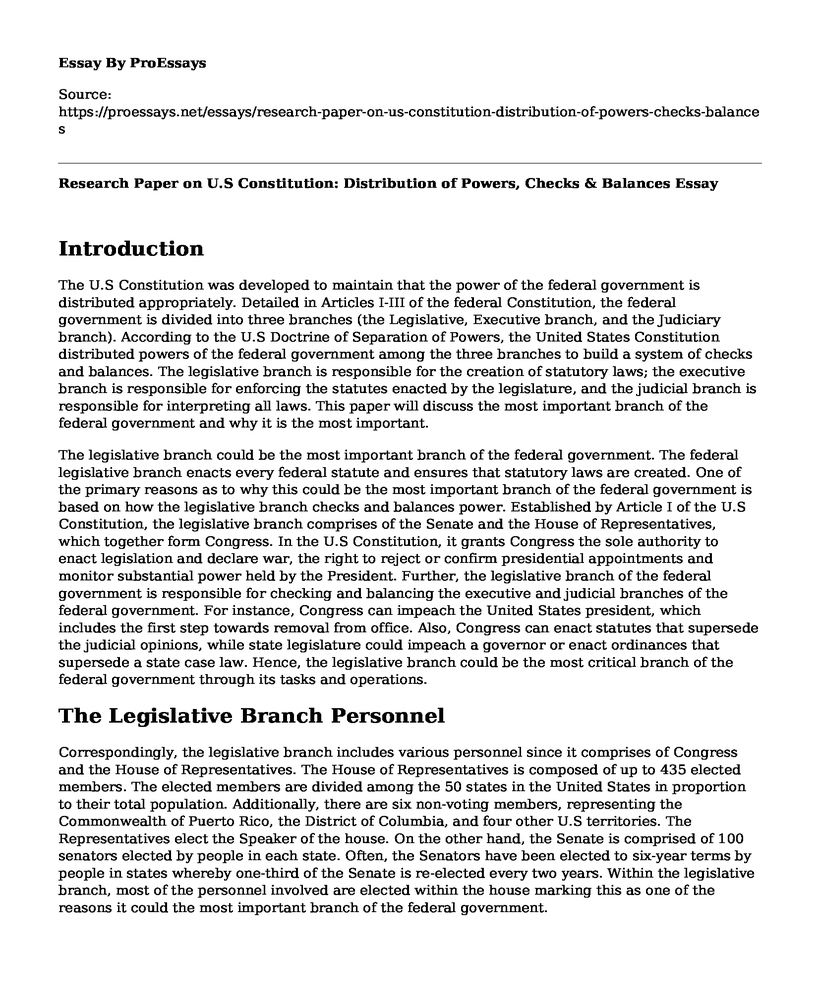Introduction
The U.S Constitution was developed to maintain that the power of the federal government is distributed appropriately. Detailed in Articles I-III of the federal Constitution, the federal government is divided into three branches (the Legislative, Executive branch, and the Judiciary branch). According to the U.S Doctrine of Separation of Powers, the United States Constitution distributed powers of the federal government among the three branches to build a system of checks and balances. The legislative branch is responsible for the creation of statutory laws; the executive branch is responsible for enforcing the statutes enacted by the legislature, and the judicial branch is responsible for interpreting all laws. This paper will discuss the most important branch of the federal government and why it is the most important.
The legislative branch could be the most important branch of the federal government. The federal legislative branch enacts every federal statute and ensures that statutory laws are created. One of the primary reasons as to why this could be the most important branch of the federal government is based on how the legislative branch checks and balances power. Established by Article I of the U.S Constitution, the legislative branch comprises of the Senate and the House of Representatives, which together form Congress. In the U.S Constitution, it grants Congress the sole authority to enact legislation and declare war, the right to reject or confirm presidential appointments and monitor substantial power held by the President. Further, the legislative branch of the federal government is responsible for checking and balancing the executive and judicial branches of the federal government. For instance, Congress can impeach the United States president, which includes the first step towards removal from office. Also, Congress can enact statutes that supersede the judicial opinions, while state legislature could impeach a governor or enact ordinances that supersede a state case law. Hence, the legislative branch could be the most critical branch of the federal government through its tasks and operations.
The Legislative Branch Personnel
Correspondingly, the legislative branch includes various personnel since it comprises of Congress and the House of Representatives. The House of Representatives is composed of up to 435 elected members. The elected members are divided among the 50 states in the United States in proportion to their total population. Additionally, there are six non-voting members, representing the Commonwealth of Puerto Rico, the District of Columbia, and four other U.S territories. The Representatives elect the Speaker of the house. On the other hand, the Senate is comprised of 100 senators elected by people in each state. Often, the Senators have been elected to six-year terms by people in states whereby one-third of the Senate is re-elected every two years. Within the legislative branch, most of the personnel involved are elected within the house marking this as one of the reasons it could the most important branch of the federal government.
Constitutional Values the Legislative Branch Represents
The legislative branch represents various constitutional values in the U.S Constitution. For instance, the legislature maintains government oversight. As a congressional check on the President's power, the legislative branch delivers a balance against the President's discretion in implementing laws and developing regulations as well. Since Congress heads the legislative branch, it is its constitutional directive to establish the annual budget for the government. The Congress levies taxes and tariffs meant to ensure funding for the government practices. The legislature led by Congress maintains investigative powers through the Government Accountability Office (GAO). GAO audits and generates reports on every section of the government to ensure accountability. Another significant way that Congress maintains government oversight is through hearings. For example, the Senate Committee on Homeland Security and Government Affairs and the House Committee on Oversight and Government Reform are dedicated to supervise and reform any actions of the government. The refusal to cooperate with the legislative instructions such as the Congressional subpoena could result in charges of Congress contempt and may lead to imprisonment. For the Senate itself, it ratifies treaties by a two-thirds vote and confirms presidential appointment through a majority vote. These are critical factors in any government, and the federal government cannot operate without such control.
Conclusion
Through different duties as delivered by the U.S Constitution, various branches of the federal government are obligated to different purposes. However, the legislative branch could be the most crucial ranch since it oversees both the executive and the judiciary. Often, the legislative branch of the federal government holds each of the other branches responsible for their duties. By ensuring that the executive and judiciary operate as expected, the legislative branch plays a vital constitutional role.
Cite this page
Research Paper on U.S Constitution: Distribution of Powers, Checks & Balances. (2023, Feb 27). Retrieved from https://proessays.net/essays/research-paper-on-us-constitution-distribution-of-powers-checks-balances
If you are the original author of this essay and no longer wish to have it published on the ProEssays website, please click below to request its removal:
- The Primary Election System: Essay on Political Science Sample
- Racial Democracy Essay
- Problems Faced by the Fox Presidency in Mexico Essay
- Effects of the Constitution on Homeland Security Essay Example
- Essay Sample on US Influence in Venezuela: Oil-Rich State, Internal Struggles & More
- US President: Most Influential Leader on Earth? - Research Paper
- National Federal Reserve - Free Essay Sample







